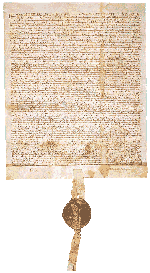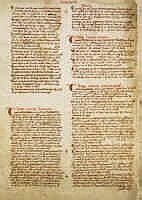|
|
|
|
|
|
|
|
| ||

|
All That: Magna Carta by Kali Harlansson of Gotland |

|
|
| ||
|
Magna Carta. The cornerstone of the English constitution. Guarantor of such
fundamental rights as due process, habeas corpus, trial by jury, and
taxation by a representative Parliament. But that's all in hindsight; what
was the story at the time? What circumstances brought King John to grant
those particular concessions?
At the start of 1215, a lot of the English barons didn't like their king. They had some specific grievances: John made unprecedented demands for money, and used extortionate means of raising it. He made heirs pay for their inheritances, married widows to the highest bidder, and stripped estates in wardship. He started a war with France they didn't want to fight, and then lost it. (Technically it was his ally, German Emperor Otto IV, who lost it, at the Battle of Bouvines.) But mostly they just didn't like him, and this was their chance to kick him when he was down. (The nature of John's character is a big question in this story. Traditionally, historians took John's enemies pretty much at their word as regards his character; as recently as 1986 the Dictionary of the Middle Ages could say, without batting an eye, that "...although he was intelligent and able, he was a pampered youngest son, had a coarse sense of humor, and was dishonest, suspicious, opportunistic, disloyal, lazy, and highly unstable." Recent historians have emphasized John's intelligence and governance, and suspect that the problem may have been largely the contrast between John's brother Richard I - a crusader, aggressively chivalrous, and above all elsewhere - and John, who was a thinker not a fighter, and actually trying to run his kingdom. Personally, I feel A.A. Milne got it about right.) Because the barons had refused to fight in his war against Philip of France, John had had to rely heavily on mercenaries, and now he had to pay them. He demanded scutage from the barons. ("Scutage" was a feudal tax payed in lieu of military service.) The barons claimed that feudal custom only obligated them to fight in defense of the realm and not in wars abroad, and therefore they owed no scutage. With the scutage demand, on top of their other problems with him, they declared John had gone too far. They demanded a reaffirmation of the liberties granted in the accession charter of Henry I. To a large extent that charter had been nothing but a package of campaign promises, issued by Henry to help him to an unopposed succession and pretty much ignored since then (even within his own reign), but the barons made it their rallying cry. When John was slow to grant them everything they asked for, they rose in open revolt under the leadership of Robert FitzWalter. The rebels in arms were only a fifth of the baronage, 40 out of almost 200, mostly from the north and east of England; another fifth of the barons actively supported John, including the redoubtable William Marshal; and the sizable majority were either neutral or inactive. The rebel barons first tried to take the city of Northampton but were turned away. They succeeded in talking London (FitzWalter had a castle inside the city walls). John brought his army to Windsor Castle, upriver from London, and negotiators met between the two sides. The results of the negotiation were written up in the form of a charter, which was signed by King John at Runnimede, on the banks of the Thames, on June 19th. The charter (which became known later as the Great Charter, or Magna Carta in Latin) comprised four sections. First was an article on the rights and liberties of the Church; this merely confirmed the settlement that had already been reached between John and the pope in May 1213, but the charter was drafted by the clergy and for them it was a point that deserved emphasis. The second section dealt with relations between the king and his barons, and put restraints on John's more extortionate money-raising. The third section concerned the administration and fairness of royal government, in particular the royal courts and Exchequer; these articles were to the king's advantage as much as the barons', and must have been easy points of agreement in the negotiations. The final articles detailed the creation of a council of 25 barons to oversee and enforce John's adherence to the charter. But those articles which, in retrospect, assumed the status of grand general principles - due process, trial by jury, the origin of Parliament - are scattered among the others with no particular pride of place, and some were even dropped in later releases of the charter. The extent to which they could have been seen at the time as general principles is itself debatable. The charter deals mostly with relations between the king and his tenants-in-chief; only a few articles refer to the rights of "free men," and under even the most generous reading this refers to at most one quarter of the male population. The charter was simply not seen as a major constitutional landmark at the time. It was called the Great Charter just to distinguish it from a smaller document drawn up at the same time, a set of concessions on forest law. It didn't address at all what was supposed to be the rebel barons' main cause, feudal service in foreign wars. And mostly, it didn't decide anything: it was not observed by either party, and the rebellion continued through John's death the following year, until it finally wore itself out in 1217. |
|
|
|
In contrast, consider a document that was a landmark at the time:
Domesday Book. William the Conqueror ordered the undertaking of a Great
Survey of his realm on Christmas, 1085; it was conducted during 1086,
compiled by September 1087, and apparently all transcribed by one copyist!
The book was in two volumes - the returns for Essex, Suffolk, and Norfolk
were not compiled with the others but were issued in a separate volume
later called "Little Domesday."
The survey is arranged by county, and within each county according to the feudal hierarchy. For each manor it lists: its holder "now" (1086), and at the time of the Conquest (1066); its size, in units of plow capacity; its value before the Conquest, at the time the present holder received it, and "now;" the numbers and classes of people working it; and all mills, ponds, meadows, woods, and other appurtenances. Whether the main purpose of the survey was to regularize taxation (the traditional view), or to institutionalize feudal land tenure (the more recent view), Domesday Book may fairly be considered "the greatest administrative accomplishment achieved by a royal government in the Middle Ages." (F.F. Kreisler) |
|
In the Current Middle Ages We have parallels in the Barony of Carolingia for both of these historic English documents. Domesday Boke (note the cute spelling) is what we used to call the baronial name and address directory (now the Liber Carolingiae). The much more significant parallel is the Great Charter. Unlike Magna Carta, it was more deliberate and decisive; like Magna Carta, it was very much the product of a conflict involving some specific personalities. In A.S. 8 a lot of Carolingians didn't like their baron. They had some specific grievances, mostly concerning Baron John's tight control over events and information. At the same time, they did not want the king (Angus) coming in to "solve" their problems. So they wrote a charter (taking the name and some of the language from Magna Carta) that delineated the roles of seneschal, autocrat, and council in light of the issues they were facing; that charter has remained the blueprint for how Carolingia works ever since. There's a lot more that can be said about the Charter, its origin, and its subsequent history, but this is not the place. |
|
Further Reading The first item here is surely the Great Charter itself. If you're Carolingian - or only interested enough in Carolingia to have gotten this far - re-read it. Read between the lines; try to see what the issues behind it were; look for what's there, and for what's not there. (Hint: look for the keywords "autocrat" and "baron," respectively - and "farspeaker," for that matter.) It may be hard to find, but do try to look at the [London] Sunday Times Magazine issue for March 28, 1986: a 900th anniversary special issue on Domesday Book, "Exclusive Report from Norman England." It's a real treat for anachronists: besides "hard news" stories, there's Sunday magazine-style features on the latest Anglo-Norman fashion, cooking, gardening, etc. Not all up to our strictest standards, but the cover photo is practically our ideal. More serious (and slightly easier to find) is a book by Michael Wood, Domesday: a search for the roots of England (1986 - another nonecentennial publication). It's not strictly about Domesday Book itself; rather, Domesday is Wood's starting point and single most important source for a study of English society through most of the early Middle Ages. There's one chapter on the question of who counted as a "free man," a crucial question in evaluating the significance of Magna Carta in its own time. Another book to read about Magna Carta in its contemporary context is the excellent historical novel Myself as Witness by the late James Goldman, author of The Lion in Winter. He says in his introduction that he regretted his "traditional" portrayal of John in Lion, and that this is his attempt to make up for it. |
|
|
|
text copyright 1999 by Caleb Hanson (e-mail) top illustrations: left is one copy of the Magna Carta, right is a page from the Domesday Book |
|
Links to Books | |

|
Wood, Michael Domesday: A Search for the Roots of England (1986, out of print; used copies available through Amazon.com) |

|
Goldman, James Myself as Witness (1979, out of print; used copies available through Amazon.com) |
Home |
Usage |
Forums |
Articles |
Patterns |
Graphics |
Extras |
Contact Us


|